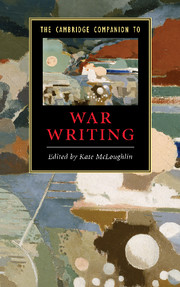Introduction
Published online by Cambridge University Press: 28 January 2010
Summary
How war is written about concerns every individual. It is vital that techniques and tools are found to represent war accurately: such representation might not stop future wars, but it can at least keep the record straight. It is equally vital that techniques and tools are found to dismantle accounts of war that are distorting or deceitful: the process of dismantling might do nothing to prevent conflict, but it can at least lay bare the nature of what is at stake. In identifying these techniques and tools, literary scholarship has a unique opportunity - that of constituting an act of good citizenship.
Less grandiosely, the study of war writing is a source of enhanced literary insight. War reverberates through literature. It is, Ernest Hemingway wrote in a letter to F. Scott Fitzgerald, the writer's “best subject,” as it “groups the maximum of material and speeds up the action and brings out all sorts of stuff that normally you have to wait a lifetime to get.” War demands the writer's best skills at evocation, not least because of duties owed to the wounded and the dead. Certain literary movements and genres cannot be understood without reference to conflict - modernism and the First World War, romanticism and the French Revolution, epic and the wars of antiquity, to give a few examples - and appreciating the workings of war literature is also a matter of comprehending their wider literary context.
A principle underlying this Companion is that all wars are different and also the same. Wars, and writings about them, function a little like the literary canon: influences work backwards as well as forwards; omissions are both inevitable and intriguing; predecessors and successors have to be read - but within reasonable limits.
- Type
- Chapter
- Information
- The Cambridge Companion to War Writing , pp. 1 - 4Publisher: Cambridge University PressPrint publication year: 2009
- 2
- Cited by

